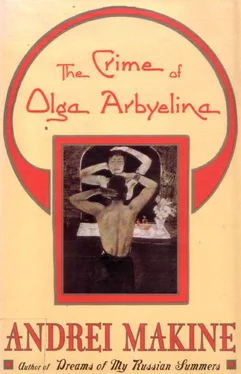Even their faces, their complexions, the expressions in their eyes, were opposed, like fragments of a mosaic that do not fit and, if forced together, disrupt the whole picture. A woman of forty-six, tall and beautiful, her abundant hair tinged slightly with gray, with features whose regularity, cool and detached, matched those of cameo portraits. A man of sixty-four with a broad face, animated by complacent joviality, a bald pate, sunburned and glistening, and a look full of self-assurance: a stocky man, with short, broad forearms and square yellow fingernails.
But what is more, you had to picture them together (this was a fact the inquiry would subsequently establish) in a rowboat out on the sunlit river. You had to bring them together on this improbable amorous excursion, see them land and settle in the grass behind the willow thickets. See the man set down on the ground a large bottle of wine he had been shading from the heat under the seat of the boat in the water stagnating on the old timbers. An hour later they had climbed back into the boat and, with the oars abandoned, were drifting toward the fateful spot, level with the ruined bridge, where the tragedy was to occur: the spot where the woman, according to her own muddled confession, had caused the death of her companion; or where the latter, according to the theory favored by the inquiry, had drowned, the victim of his own clumsiness, the drink, and an unfortunate collision with a pillar.
For uninvolved spectators every crime of passion acquires a covertly theatrical interest. The townspeople of Villiers-la-Forêt, once the shock of the first minutes had passed, discovered this diverting aspect, although its attractions had to be concealed behind a grave exterior. They applied themselves to the game with a will. The tedium of their daily lives encouraged this but so did the progress of the inquiry itself. Examinations of witnesses, confrontations, searches, seizures- the mere use of these terms in breathless discussions offered each of them a new and unexpected role, uprooting them from their stations in life as baker, schoolteacher, or pharmacist. Indeed the pharmacist (who had remained idle since his pharmacy was destroyed by mistake in an Allied bombing raid) no longer spoke anything but this language, halfway between case law and a detective novel, as if it satisfied his taste for Latin terminology.
The fact of having to take the oath before giving evidence also had considerable importance. To the point where the youth who had been fishing at the moment of the tragedy emphatically insisted on repeating before the investigating magistrate the formula "the truth, the whole truth, and nothing but the truth," although his age exempted him from this.
The drowning of Golets, through accident or foul play, had quickly become an inexhaustible subject of conversation for the people of Villiers, since the progress of the inquiry always kept it fresh. In particular, it was a topic for all occasions, one that abolished the invisible frontier between upper town and lower town, between groups that hitherto had no contact with one another, and worked wonders in bringing strangers together. This whole verbal ferment was, in truth, based on few material facts. Thanks to the "no secrets" of small towns it was learned that the search of Golets's home had only brought to light a pistol with a single cartridge in the magazine, a collection of bow ties (some people mistakenly reported this as a collection of bows and arrows), and brief notes written on scraps of paper recording someone's visits to Paris. As for the Princess Ar-byelina, no one had ever seen her in the company of this man. One witness, it is true, had seen them going together into the long shooting gallery, a kind of fairground booth in the big park in the upper town. But this visit, objected others, had only taken place shortly before the boat trip. Suddenly, within the space of a few hours, their adventure had become possible. What action, what word (coming from the man? from the woman?) had made it so?
The alleged rendezvous at the shooting gallery; the collection of bow ties that was so out of keeping with the image of a senior citizen tending his garden; the few rare visits made by a mysterious "Parisian friend" to the heroine of the tragedy: these meager details proved sufficient to unleash an endless avalanche of theories, hypotheses, and conjectures, to which were added some scraps that the preliminary investigation had apparently allowed to filter through. An excited, unquenchable chorus of voices combined in a wild round of truths, fabrications, and absurdities such as can only be trotted out in the course of the verbal orgy that follows a sensational crime in a provincial town.
During those summer months everyone at Villiers-la-Forêt tried out the roles of storyteller and sleuth. Every day, thanks to these countless mouths, the ghosts of the man and woman in the boat relived their last afternoon together. The townspeople discussed it standing in line at the baker's, on the terrace at the Café Royal, on the dusty square where they played boules, in the train during the hour-long journey that lay between them and Paris. They were on the alert for every new scrap of information, every little secret, without which their own picture of the crime might be left less complete than that of their neighbors.
And then, several days after the event, they discovered an article in a Paris newspaper. Two narrow columns in all, but in a context that took your breath away. The account of the local tragedy was sandwiched between Princess Elizabeth's engagement and this brief news item: "The plot against the Republic has been foiled. The Comte de Merwels and the Comte de Vulpian have been charged." Never before had the people of Villiers enjoyed so fully the feeling that they were making world news. The item about the tragedy that had taken place in their town ended with this observation: "It is now the task of the inquiry to establish whether what occurred was a mere accident or a premeditated and cunningly executed murder, a hypothesis that appears already to have won credence among the citizens of Villiers-la-Forêt."
The boating tragedy even altered certain deeply ingrained habits in the town. People who liked to saunter along the riverbank in the evening now continued their stroll a little farther, until they reached the glade amid the willows where the fatal rendezvous was said to have taken place. Young people, for their part, had abandoned their traditional bathing place and exhausted themselves diving at the spot where Golets had drowned, hoping to find his watch, a heavy gold timepiece with a two-headed eagle on the cover…
The fever for detection was universal. However, the two populations of Villiers-la-Forêt, French and Russian, were in fact piecing together quite distinct stories.
For the French, what the odd couple's adventure marked, above all, was the real start of the postwar era. If you could once more drift down the river in an old boat with your arms around a woman and a bottle of wine under the seat then peacetime had returned for good. The fatal turn of events only confirmed this impression. In one Paris paper a brief account of the drowning had succeeded for the first time in displacing the headline purged that recurred in issue after issue, often with news of death sentences… Furthermore, in the same newspaper they were announcing the start of the Tour de France 47, the first since the war.
The Russians, too, saw Golets's death as what might be called a historic event. Those who that July afternoon had feasted their eyes on the man stretched out in the grass and his companion, whose body looked naked beneath the fine, wet fabric, all the Russian inhabitants of the lower part of the town felt, almost physically, that the passage of calm, predictable days had been shattered there on the riverbank. Indeed, they sensed the advent of a new before and after in their personal chronology.
Читать дальше












